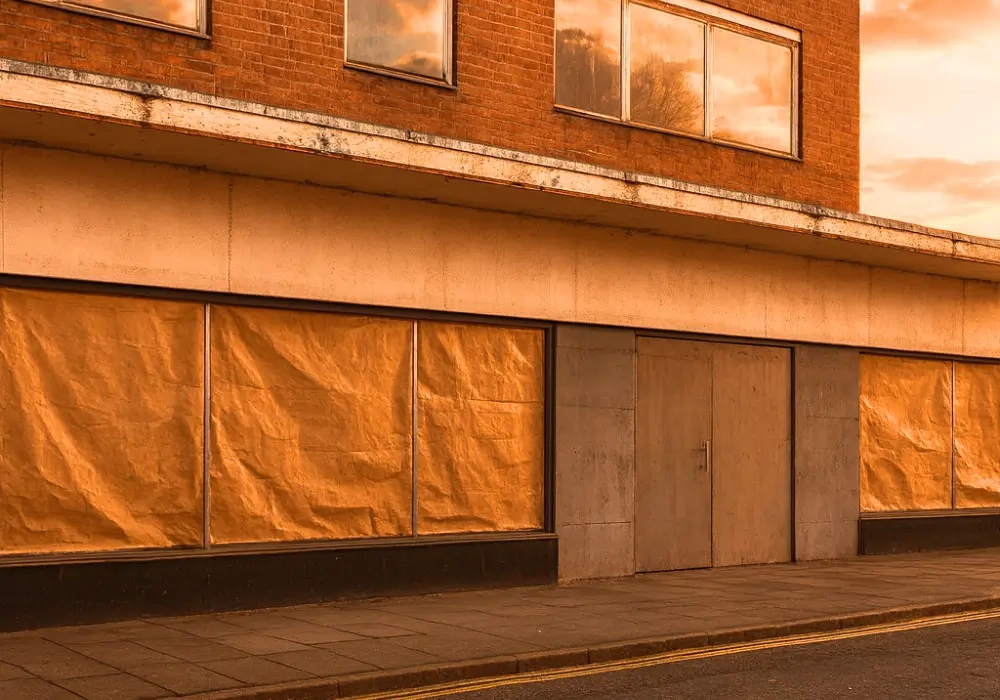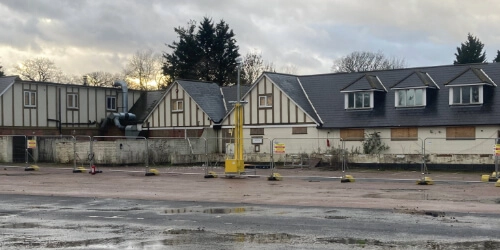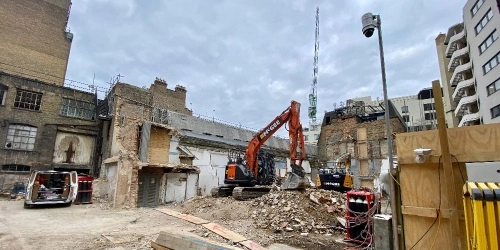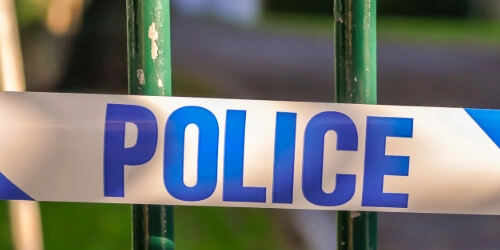Although most businesses and landlords will be aware of the maintenance and repair costs for commercial premises, most will not anticipate the hidden costs associated with squatting.
From property damage to legal bills, we explore the hidden costs nobody tends to budget for when it comes to their commercial premises being acquired by squatters.
What is Commercial Squatting?
Commercial squatting is the illegal occupation of an empty commercial building or of its land without the owner’s or landlord’s permission.
Although residential squatting was made a criminal offence in 2012, resulting in a penalty of up to 6 months in prison, £5,000 fine or both, commercial squatting is still not considered a criminal offence.
This means the response provided to squatting at commercial properties is not the same and is generally named a civil offence, so there is no legal punishment for that matter.
Why Are Commercial Properties Vulnerable to Squatting?
Well, as mentioned, squatting at commercial properties is considered a civil offence, not criminal which limits the response that can be provided by the Police.
This alone makes them an enticing target because business owners and landlords will often have to engage in a lengthy legal process, involving court proceedings to remove those illegally occupying the property.
Delays and other obstacles can complicate this process further, and during this time, individuals cannot be forcibly removed by Police officers.
Most intruders will be aware of the legal gap on commercial squatting, and will utilise this to their advantage in order to evade any criminal record or repercussions themselves.
They will likely also know that if squatters maintain occupancy for a certain period of time, they can gain adverse possession of the commercial property which increases their vulnerability.
Commercial properties are more likely to face prolonged periods of vacancy due to renovation works, tenant changes and increased risk of financial difficulties.
Vacant properties of all types face a greater likelihood of squatting as empty, unoccupied properties are considered easier opportunities for such activities.
There tends to be an assumed lack of surveillance and regular checks of vacant properties, providing more protection to squatters in both gaining occupancy of the property and sustaining this.
These contributing factors lessen the security commercial properties often have and this leaves them vulnerable to squatting.
Although, squatting alone may not appear to hold large financial implications, you’ll be surprised to know that there are many hidden costs associated with this, and as owners and landlords, you’ll likely be the ones footing the bill.
The Hidden Costs of Squatting on Commercial Premises
As commercial property owners and landlords, you’ll understand the laws surrounding squatting, however, are you aware of the hidden costs that can come from it?
We explore these hidden costs in more detail and the financial impact this can have on you or your business.
Lost Rental or Lease Income
Commercial property generally is rented or leased, meaning that tenants of that property may choose to leave at some point and you will need to find new ones to take over.
However, during this period of transition, there’s a high chance that your property will be left empty and this leaves it at risk of squatting.
If squatters manage to gain access and gain occupation of your commercial property, you’ll be unable to rent or lease it until they are removed. This can take months and during this time, you’ll be losing out on rental or lease income.
For example, let’s say your monthly rent is £7,000 to tenants, but you have squatters and the process takes 3 months to remove them, you’ve lost out on a total of £21,000.
This is a direct loss of income and can be off-putting to future tenants which can create further rental loss issues.
Expensive Legal Bills
The process to evict squatters generally involves a legal process to do so, and this can start at around £5,000, quickly increasing depending on the complexity of the case.
Although, in rare cases you’ll find you can create a peaceful agreement for the squatters to leave, this is extremely unlikely and the route most will need to take is to apply for an order of possession.
Even after gaining this, you could simply be faced with an uphill battle of claiming your commercial property back, especially if they refuse to do this.
Essentially, the longer the process takes, the larger the legal bills are going to become for you as an owner or landlord.
Increased Insurance Premiums and Void Insurance
As commercial property owners and landlords, you’ll be aware of the insurance in place and the provider for this, but have you read the small print to ensure you have the right coverage for squatting?
Due to the heightened risk of commercial squatting, many insurers will expect you to take reasonable steps to secure your property from this, otherwise your insurance could be considered void.
Also, if you neglect to inform them of this occupancy, this could also lead them to void insurance, leaving you completely exposed financially and resolving it out of your own pocket.
And this is not the only cost you could incur, even if your claim is accepted and your insurer can support you with the financial implications of commercial squatting, this could increase your insurance premium in the long-run.
The more claims reported, especially for the same or similar reasons, the higher your insurance will become in future, as insurers will consider you high-risk and align your premium to this.
This may not be an immediate loss, it’s a long-term cost which can add up and impact the profit you earn from it.
Property Damage
Squatting itself can cause enough financial damage in itself, however, it is also commonly associated with severe property damage such as, stripping fixtures, dumping large amounts of rubbish and creating hazardous conditions.
You won’t have any idea on the scale of damage caused by squatters, but one thing you can guarantee is that you’ll be responsible for cleaning up and repairing any damage following their removal.
All these costs are a direct loss of finances for you as an owner or landlord, and in order to rent, lease or sell the commercial property in future, you’ll need to resolve them quickly in most instances.
You could lose thousands to property damage, and the longer squatters occupy your property, the higher the likelihood this cost will grow.
Health and Safety Liability Claims
Property owners and landlords are responsible for the health and safety of the property and could be held liable for any injuries that occur on-site, including squatters.
Whether an individual is authorised or not to be at your commercial property or its land, if they injure themselves, you could face a liability claim requesting compensation on the matter.
If you have been shown to not maintain basic safety standards, squatters have a foundation to log a liability claim towards you.
The costs from such situations will depend on the injury that has occurred, legal process and outcome of the case.
Legal bills can become expensive, and pay-outs even more so.
Reputational Damage
As mentioned earlier, many commercial properties are rented or leased, and therefore if there is a period of vacancy, you’ll be looking for new tenants to take over.
If during this time, your property becomes occupied with squatters or has previously faced this issue, new tenants are less likely to show interest due to risk of property damage, neglect and heightened risk in the future.
Reputational damage like this can be long-lasting, and can be extremely difficult for you to recover from.
It can lead to rental and lease loss, expanding over your full portfolio if you have multiple properties under your responsibility as tenants may avoid them also.
Preventative Measures for Commercial Property Businesses and Landlords
To stop squatting, you must take preventative steps with your commercial property that helps to secure it against this and make it more difficult as a target.
With over 20-years of experiences in security solutions, we’ve formed key steps you can take to protect your property against squatting:
Invest or Upgrade Your Security Measures and Monitoring Solutions
One of the first steps you should take to prevent squatting is to increase the physical security at your commercial property to create a visible deterrence against any individuals looking to occupy the property illegally.
There are a variety of security measures you can put in place to provide this:
- Mobile CCTV Cameras
- Perimeter Fencing
- Security Patrols
- Access Control Measures
All of the above work to visibly deter the unauthorised access of any individuals by informing them that the property is being monitored.
This increases the difficulty of it as a target, and for squatters, who are often looking for an easy opportunity, they may simply loom elsewhere for residence.
For all rounded protection, we’d recommend installing mobile CCTV cameras as these work as both visible deterrents and monitoring systems that can prevent and record events.
Compared to perimeter fencing and security guards, they offer 24/7 constant coverage, covering those occasions where your property is most vulnerable, like at night.
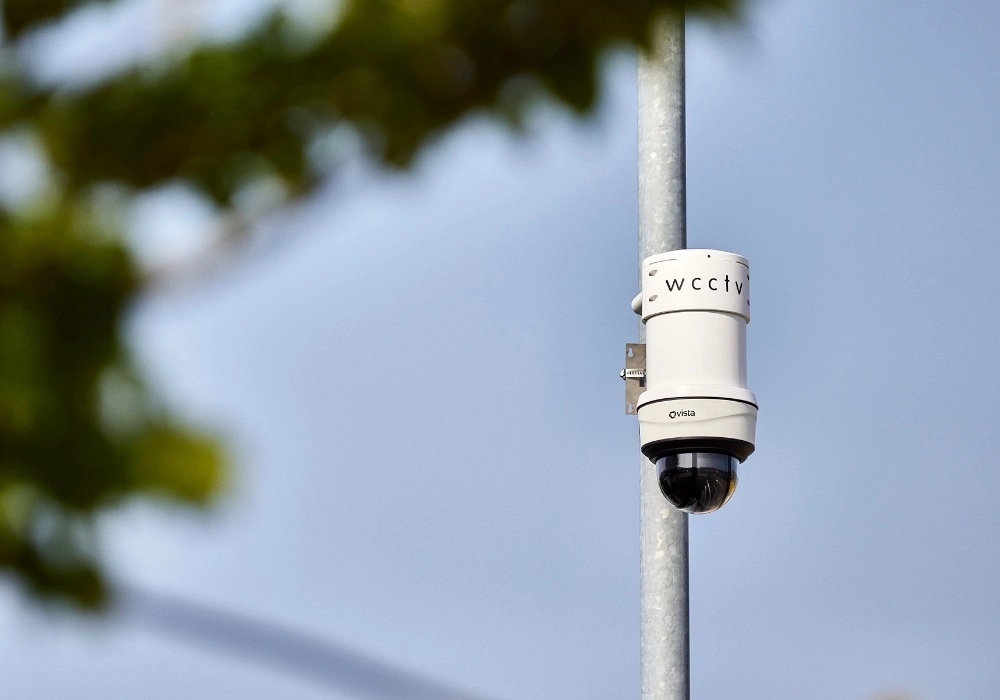
Complete Regular Property Inspections
Commercial properties when vacant are easy targets for squatters due to the lack of legal coverage and assumed lessened surveillance.
That’s why completing regular maintenance checks can help minimise your property as a target and let potential squatters know it’s being monitored.
As an owner or landlord during this time of vacancy, even over a short period should be running regular property inspections. This helps look for any faults, damage and most importantly, any signs of occupancy.
During the inspection, ensure you cover all areas of the property and its land, identifying any signs or concerns, noting them down and promptly addressing them following this.
For occasions where you may be unable to run these checks, implement signage on the property and around its perimeter to inform any unauthorised individuals that the property is being monitored.
Review and Update Any Health and Safety Procedures
Health and safety can be a forgotten factor with commercial properties, particularly those left vacant as it can be assumed that no individuals will be entering the property during this time.
However, you can still be held liable for any injuries of unauthorised individuals and squatters, and this can lead to expensive legal bills and pay-outs.
To avoid this, you should regularly review your health and safety procedures, as well as complete property inspections to ensure it fulfils the legal expectations set out within the UK.
If there are any adjustments to be made to procedures, you should do this promptly and accurately, informing all those of the new policies in place.
You should also follow this up with training to any property managers or relevant personnel within your business and implement signage if required to inform the public.
Check Your Insurance Coverage at Frequent Intervals
Insurance is crucial to maintaining financial protection against squatting for you as an owner or landlord, particularly in cases where individuals have managed to obtain occupancy of your property.
However, to ensure you remain covered in this way, you need to make sure that your policy still protects you from this and that you're implementing the correct measures to avoid having your insurance made void.
Throughout your existing policy, you should check for any updates or adjustments that have been made by the insurer. These might provide you with the opportunity to look elsewhere or give you time to make any necessary adjustments.
By doing this, you’ll remain in the loop with your policy and ensure continuous coverage of your property.
Also, nearing the end of any policy you should shop around and consider your options. Insurance policies can differ, especially in price, so this provides you with the chance to compare.
Vacant property insurance is particularly expensive, so any way to lower insurance costs for you will benefit you financially.
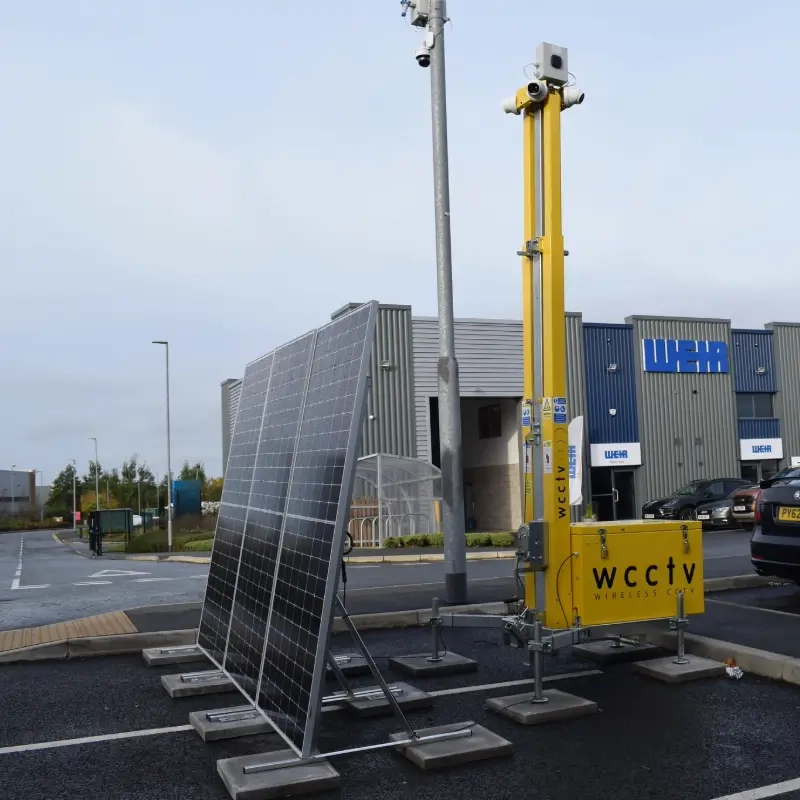
Take Control of Squatting at Your Commercial Property with WCCTV
Don’t hide from the cost caused from squatting and take action today with the help of WCCTV.
Our range of squatting prevention solutions aim to support commercial properties of all types, from vacant retail units to busy industrial estates.
Fitted with high-quality, IR PTZ cameras, all our offerings provide accurate, proactive threat detection, helping to prevent and intercept squatting before they can even gain access to your property.
At WCCTV, we specialise in a fully-managed security service, from installation to backing all our products with remote CCTV monitoring, we provide ongoing support that is unmatched.
We understand that as owners and landlords, you could be managing multiple properties and you can’t have your eyes on them at all times.
Our squatting prevention solutions, whether it be our CCTV Towers or Redeployable CCTV Cameras offer those extra eyes when you can’t always provide them.
With rental options to suit your needs, our services are designed to be used when you need them most.
Speak with a squatting prevention expert today to enquire about how we can support your commercial property’s protection.
